
Register with Plumtri!
Register on plumtri as an Individual or as an Organisation to gain access to all of its useful features and remain updated on the latest R&I news, events and funding opportunities.
-
 Welcome to plumtriA platform for Research & Innovation
Welcome to plumtriA platform for Research & Innovation -
 Looking for Funding?Check out the current open calls
Looking for Funding?Check out the current open calls -
 Register today to start receiving our monthly newsletter
Register today to start receiving our monthly newsletter -
 Looking to partner up?Search our list of registered profiles
Looking to partner up?Search our list of registered profiles -
 You have questions on a particular funding programme?
You have questions on a particular funding programme?
Calls for Funding
Filter
Calls
EENergy Energy Efficiency Grants
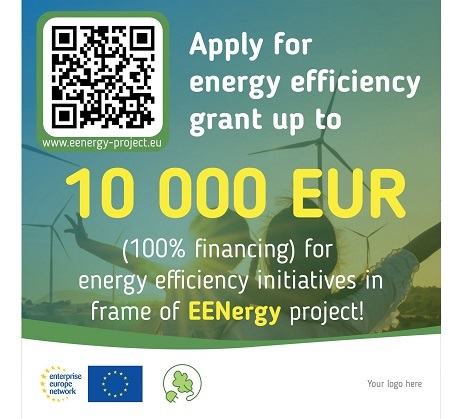
Source of Funding: Enterprise Europe Network
Is your company in search of support for energy efficiency improvements?
In 2 years EENergy project will distribute €9 million in form of 900+ grants for SMEs throughout Europe to engage in activities, purchases or integrations that will improve their overall energy spendings with a minimum of 5 %.
Each company can apply for maximum 10 000€ grant with 100% financing. EENergy project is implemented in cooperation with Enterprise Europe Network sustainability services under the Single Market Programme.
To apply find your Enterprise Europe Network local contact point and be in touch with our sustainability advisors!
Visit the below link to learn further.
Information and image source:
AgriTech4Egypt Call
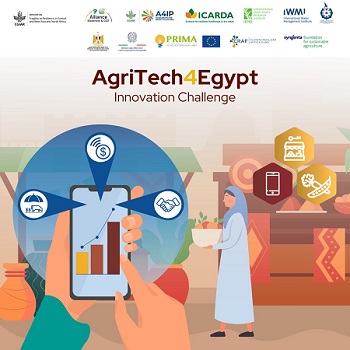
Source of Funding: AgriTech4Egypt
The AgriTech4Egypt Innovation Challenge is a program designed specifically for early-stage agri-tech ventures in Egypt. At this stage, you must have a Minimum Viable Product (MVP) or Proof of Concept (POC). This program will support and prepare you to build a solid go-to-market strategy through technical validation and access to the market.
This program is powered by CGIAR Accelerate for Impact Platform (A4IP) and co-organized with CGIAR Centers–The Alliance of Bioversity International and CIAT, ICARDA, IWMI, and IFPRI–and the Academy of Scientific Research and Technology (ASRT) of Egypt. This project is endorsed by the Ministry of Higher Education and Scientific Research of Egypt (MOHESR) and supported by PRIMA, Climate Resilient Africa Fund (CRAF), Syngenta Foundation for Sustainable Agriculture (SFSA), and CGIAR Initiatives and units operating in the MENA region.
Click on the below link to read further.
Information and image source:
Venture Incubation Program
Source of Funding: EIT Digital
Do you have a business idea and want to turn your innovative digital technology into an MVP and start your venture?
EIT Digital Venture Incubation Program supports European Enterpreneurs from 24 different countries in:
- Getting financial support of up to € 30,000
- Develop your Minimum Viable Product
- Establish your deep tech venture
- Get business development help from top international experts
- Find a first investor
- Join Europe's leading innovation ecosystem
Requirements
- Multidisciplinary teams of at least two individuals with an innovative business idea, PoC or prototype in the fields of Digital Industry, Digital Tech, Digital Wellbeing, Digital Finance or Digital Cities.
- Non-legal entities or startups incorporated after 01/01/2024.
- Residents of any of the following 24 countries: Bulgaria, Croatia, Cyprus, Czech Republic, Estonia, Germany, Greece, Hungary, Italy, Latvia, Lithuania, Malta, Montenegro, North Macedonia, Poland, Portugal, Romania, Serbia, Slovakia, Slovenia, Spain, Sweden, Turkey, Ukraine.
Visit the below link to continue reading.
Information and image source:
Women TechEU Call
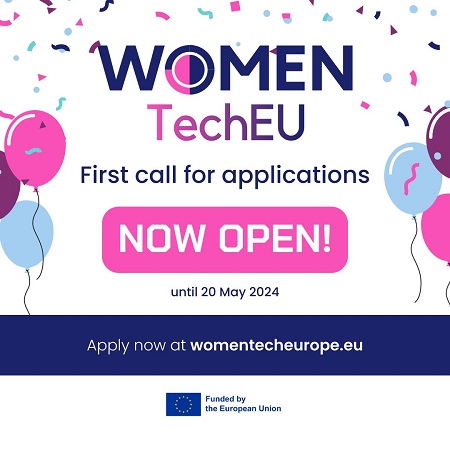
Source of Funding: Women TechEU
Women TechEU is a 2-year EU-funded project supporting women leading deep tech startup companies from Europe.
Our mission is to create a more gender-balanced entrepreneurship ecosystem. We believe that diversity drives innovation, and we are here to provide women in deep tech with more opportunities, resources, and support to thrive.
The project consortium is launching 4 calls for applications over the span of 2 years which, following a rigorous evaluation process, will result in a total of 160 beneficiaries. Each beneficiary will receive €75k grants (non-dilutive finance) as well as a personalised business development programme which includes mentoring, coaching and targeted training among other options.
Visit the below link to download guidelines and read other information.
Information and image source:
Cyber Assess Scheme
The Cyber Assess Scheme aims to bolster businesses’ security and resilience by offering specialised cybersecurity expertise and services. This initiative empowers businesses to proactively handle cyber threats, strengthen local enterprises, and reduce supply chain risks in the private sector. Tailored offerings furnish technical and business acumen, enhancing IT system security and effectively addressing information security threats.
This project is fully funded by the Recovery and Resilience Facility fund which is part of the NextGenerationEU Programme.
Scope of Scheme
Our comprehensive services focus on assessing IT systems and infrastructure (excluding Software as a Services (SaaS), Platform as a Service (PaaS), SCADA, Operational Technology (OT), and personal devices), emphasizing Vulnerability Assessments, Penetration Testing, Security Architecture Reviews, Risk Assessment, and Audits & Reviews.
Get a Free Cybersecurity Service:
The Cyber Assess Scheme will operate on a first-come, first-served basis, subject to service availability. With a dedicated budget of up to €150,000, the scheme provides free of charge services to eligible enterprises. To ensure equitable distribution and effective utilization of resources, specific allocations have been established for each service category.
Continue reading on the below link.
Information, image and video source:
SeaClear 2.0 - Call for Associated Regions
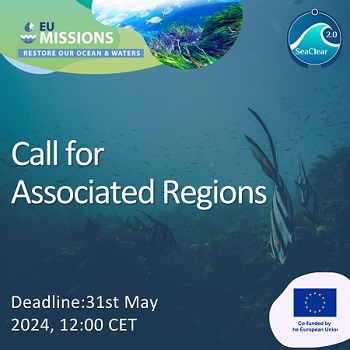
Source of Funding: SeaClear 2.0
SeaClear2.0 is seeking to collaborate with 5 Associated Regions in the Atlantic +Arctic, Baltic, Mediterranean, and Danube/Black Sea basins. With a grant of up to €100,000 each, the selected regions will be strategic partners, showcasing the feasibility, replicability, and scale-up of SeaClear2.0’s pioneering solutions for identifying, collecting, and valorising marine litter. In return, the selected regions will have the opportunity to enhance their capacities and approaches to identify and implement site-specific solutions for preventing and minimising marine litter and foster an ocean literate society through community activation and citizen engagement, in their regions.
Funding Activities
The type of activities that can receive financial support include:
- Collection of underwater marine litter images
- Solutions to handle marine microplastics
- Marine litter collection solution at beaches, coastal areas, and rivers
- Marine litter reuse and upcycling approaches
- Developing/ implementing mitigation and prevention strategies for marine litter
Deadline for submissions: 31st May 2024, 12:00 CET
For questions or further details please contact us at: oc2.0@seaclear-project.eu
Visit the below link to download the call guidelines.
Information and image source:
THCS Joint Transnational Call 2024 – Innovate to Prevent: Personalised Prevention in Health and Care Services
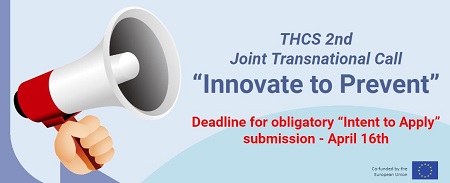
The European Partnership in Transforming Health and Care Systems (THCS)’s SECOND joint transnational call for proposals entitled “Innovate to Prevent: Personalised Prevention in Health and Care Services” is NOW OPEN! This partnership gives the opportunity to coordinate and optimize research and innovation efforts in Europe and its partner countries supporting the much-needed transformation of health and care systems.
MCST together with other Research Funding Organisations from 20 countries launched the 2nd Joint Transnational Co-funded Call and will be financially supporting R&I projects supporting the implementation of innovative person-centred health and care models addressing prevention strategies, with the key help of existing IT and digital technologies and services, as well as existing and emerging data. The ultimate goal is to improve health and care system dimensions such as quality, efficiency, equity, and sustainability. Improving the quality of preventive services will lead to improving the quality of life of citizens and patients, as well as reducing the burden and costs for the entirety of health and care services.
Entities based in Malta are eligible to request up to € 500,000 in funding so that together with their consortium they can submit a proposal to this second THCS transnational call (N.B. if more than one National partner is present in one consortium, the total amount of funding for the participating National partners cannot exceed the € 500,000 capping).
Visit the below link to download the national application forms and guidelines.
Information and image source:
FUSION Technology Development Programme LITE
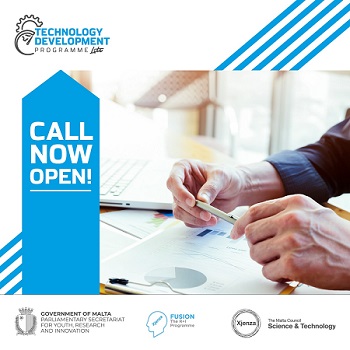
Source of Funding: Malta Council for Science and Technology
The Malta Council for Science and Technology would like to announce that it is currently receiving project proposals under the FUSION Technology Development Programme LITE.
- The call closes on the 23:59pm of Wednesday, 10th of April, 2024 .
- This call provides financial support for research, development and innovation preferably within the SMART Specialisation Areas.
- The focus is on innovative research with high commercial Impact.
- An Information Session will be held at 10am on the 4th of March. Please register at: https://forms.gle/A9v6KcsMv7CAhAFP9
- More information on this opportunity for funding, the eligibility criteria, the rules for participation and the application form, can be found in the attachments below.
- The additional documentation to be submitted together with the application form for this call can be found on the MCST Resource page here: https://mcst.gov.mt/resource-page/
- Please note, submission is to be done through email. File size limits may apply when submitting. Please ensure that the email does not bounce back after submitting.
- Please note that the call documents are currently still awaiting approval from the necessary authority and may be amended. In the case of an amendment a note of the date of amendment will be uploaded here, on this web page.
Visit the below link to download application forms and guidelines.
Information and image source:
Restore4Life Call
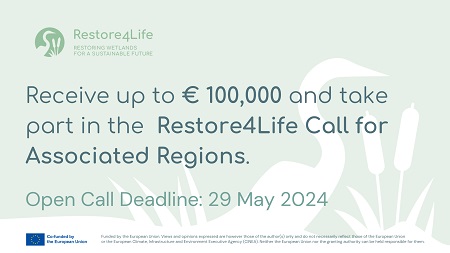
Restore4Life are looking for at least 5 Associated Regions to receive up to €100,000 to prepare roadmaps, plans, and projects to restore wetland ecosystems in their region. The Call for Associated Regions is specifically designed to engage and collaborate with Local and Regional Authorities.
The aim is to share the results and knowledge of the project on an ongoing basis with the selected ‘associated regions’ and to provide them with scientific and technical support for the implementation of wetland restoration solutions in their territory. This will involve the twinning of each Associated Region with a similar demonstration site and the provision of technical advisory services necessary to prepare roadmaps, plans and projects to restore ecosystems in the associated regions addressing possible barriers and showing the feasibility of implementing innovative solutions.
On March 22, from 10 AM CET, Restore4Life will hold an Interactive Workshop on the Application for the Open Call. The workshop aims to provide valuable insights, clarify any questions you may have, and offer guidance on creating a successful Open Call application. We believe this session will be instrumental in ensuring a comprehensive understanding of the application requirements and, in turn, contribute to the success of your submission. If you’d like to attend the Workshop, you should register here.
The Open Call closes on 29 May 2024 at 5 PM CET (Brussels time).
Visit the below link to read further.
Information and image source:
FUSION R&I: Research Excellence Programme 2024 Call
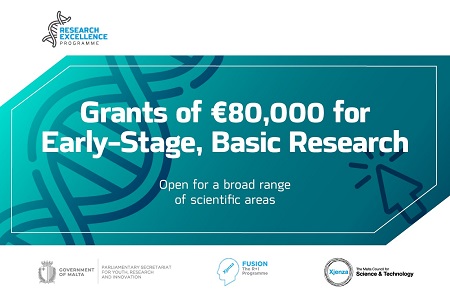
Source of Funding: Malta Council for Science and Technology
The Malta Council for Science and Technology would like to announce that it is currently receiving project proposals under the FUSION R&I: Research Excellence Programme.
This call provides financial support (up to €80,000) for the early-stage development of innovative projects, through a bottom-up approach. All scientific research areas are being considered, and for projects which may be commercially applicable, this programme targets research at the initial Technology Readiness Levels (between TRL 1 and TRL 4).
Project proposals should be sent electronically and received by not later than 23:59 CET on Monday, 18th March, 2024.
More information on this funding opportunity, the eligibility criteria, the rules for participation and the application form, can be found on the below link.
Contact us by email on rep.mcst@gov.mt (keeping eric.balakrishnan@gov.mt in copy) for further information and to schedule one-to-one meetings.
An online information session will be held on Monday, 12th February 2024 at 13:00 CET. Click here to register for this informative event.
Information and image source:
